Meet 26 New Stadtman Investigators
Trans-NIH Search Process Recruits Creative, Independent Thinkers
Meet 26 new investigators who were recruited through the Earl Stadtman Tenure-Track Investigators Program, named for renowned biochemist, senior investigator, and mentor Earl Stadtman (1919–2008). Stadtman devoted his 57-year career at NIH to identifying the mechanisms of cellular energy expenditure and metabolism. He was chief of the Laboratory of Biochemistry at the National Heart, Lung, and Blood Institute from 1962 to 1994.
The Stadtman program, a trans-NIH search process that crosses all areas of biomedical research, is designed to attract a diverse group of talented early-career scientists who might not apply to NIH via searches conducted by individual institutes and centers (ICs). Stadtman applicants are asked to share their ideas for a novel research program, their career aspirations, and how they would contribute to the NIH mission. For those qualifying, NIH tries to create a tenure-track position in one of the ICs to match that talent.
Two of the Stadtman Investigators featured here are part of the 2017 recruiting cycle and joined NIH in 2021. The 24 other investigators applied in the 2018 cycle and joined NIH in 2019 and 2020.
For more on the Stadtman program, how to apply, and links to stories about other Stadtmans, go to https://irp.nih.gov/careers/trans-nih-scientific-recruitments/stadtman-tenure-track-investigators.
FROM 2017 APPLICATION YEAR
Melissa Brotman, Ph.D. (NIMH)

Neuroscience and Novel Therapeutics Unit, Emotion and Development Branch, National Institute of Mental Health
Research: Leveraging neuroscience and therapeutics to develop and test novel interventions for serious psychiatric disorders.
Became Stadtman Investigator in 2021
Neil Hanchard, M.D., Ph.D. (NHGRI)

Center for Precision Health Research, National Human Genome Research Institute
Research: Using human genetics and genomics to better understand the pathophysiology and etiology of childhood diseases in diverse populations.
Became Stadtman Investigator in 2021
FROM 2018 APPLICATION YEAR
Takashi Akera, Ph.D. (NHLBI)

Laboratory of Chromosome Dynamics and Evolution, National Heart, Lung, and Blood Institute
Research: Using mouse oocytes to reveal the mechanisms underlying meiotic drive, in which selfish genetic elements violate Mendel’s Law of Segregation (two alleles of a gene have an equal chance to be transmitted to gametes) to increase their own rate of transmission.
Became Stadtman Investigator in 2019
Benedict Anchang, Ph.D. (NIEHS and NCI)
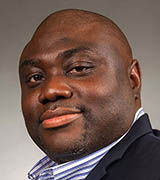
Biostatistics and Computational Biology Branch, National Institute of Environmental Health Sciences (and joint appointment in National Cancer Institute)
Research: Performing multiscale modeling, visualization, and integration of dynamic perturbation effects of complex biological processes (in human and nonhuman systems), such as cancer, drug response, or toxicity for precision health.
Became Stadtman Investigator in 2019
Michelle Antoine, Ph.D. (NIAAA)

Section on Neural Circuits, National Institute on Alcohol Abuse and Alcoholism
Research: Understanding how genetic and environmental insults affect the computation of neural signals within brain networks to cause neurodevelopmental disorders such as autism, epilepsy, and attention-deficit-hyperactivity disorder.
Became Stadtman Investigator in 2020
Alexander Cartagena-Rivera, Ph.D. (NIBIB)
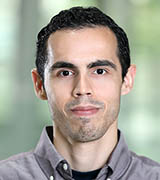
Section on Mechanobiology, National Institute of Biomedical Imaging and Biomedical Engineering
Research: Understanding cellular and tissue molecular-mechanical regulation and developing advanced atomic-force microscopy technologies for developmental, cancer, and hearing research.
Became Stadtman Investigator in 2019
Jiyeon Choi, Ph.D. (NCI-DCEG)

Laboratory of Translational Genomics, Division of Cancer Epidemiology and Genetics, National Cancer Institute
Research: Understanding genetic susceptibility to melanoma and lung cancer; identifying genes and molecular pathways through which heritable genetic variants confer increased cancer risk.
Became Stadtman Investigator in 2019
Erin Davies, Ph.D. (NCI-CCR)
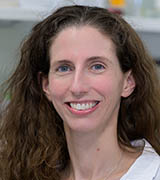
Cancer and Developmental Biology Laboratory, Center for Cancer Research, National Cancer Institute
Research: Determining the embryonic origin of sustained adult pluripotency and lifelong regenerative abilities in freshwater and marine flatworms; providing paradigms for reverse engineering tissue regeneration in nonregenerative mammalian systems.
Became Stadtman Investigator in 2020
Jeffrey Farrell, Ph.D. (NICHD)

Unit on Cell Specification and Differentiation, Eunice Kennedy Shriver National Institute of Child Health and Human Development
Research: Combining single-cell genomics, imaging, genetic, and classical embryological approaches in zebrafish models to investigate the signals and gene expression events that drive cell specification and differentiation during vertebrate embryogenesis.
Became Stadtman Investigator in 2020
Peng Jiang, Ph.D. (NCI-CCR)
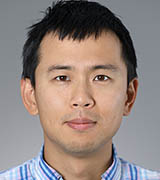
Cancer Data Science Laboratory, Center for Cancer Research, National Cancer Institute
Research: Using both genomics and imaging data to identify new regulators in cancer immune evasion; developing infrastructures that enable users to leverage big data resources to find immune-evasion mechanisms in their own clinical studies and to inform cancer-therapy decisions.
Became Stadtman Investigator in 2019
Laurie Krug, Ph.D. (NCI-CCR)

HIV and AIDS Malignancy Branch, Center for Cancer Research, National Cancer Institute
Research: Applying novel molecular approaches to define the gamma-herpesvirus proteins and host-signaling networks that are required for different stages of infection; conducting mechanistic studies of the virus-host interplay to identify new, effective interventions to treat and prevent cancers driven by Epstein-Barr virus and Kaposi sarcoma-associated herpesvirus.
Became Stadtman Investigator in 2019
Yuanyuan (Kevin) Liu, Ph.D. (NIDCR)
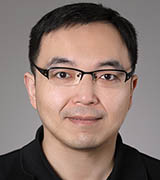
Somatosensation and Pain Unit, National Institute of Dental and Craniofacial Research
Research: Using a multidisciplinary approach to decipher supraspinal circuits in somatosensory perception; investigating the underlying mechanisms of top-down control in chronic pain states; determining how our mental states directly alter normal and pathological somatosensory perception; and identifying potential targets for treating pain.
Became Stadtman Investigator in 2020
Emmanouil Maragkakis, Ph.D. (NIA)
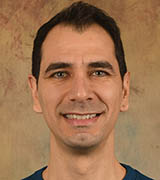
Computational Genomics Unit, RNA Regulation Section, National Institute on Aging
Research: Using experimental and computational approaches to understand the high-dimensional regulation of gene expression as a key component of identifying the mechanistic basis of the physiology and diseases of aging; discovering fundamental biological mechanisms that control RNA stability and dynamics.
Became Stadtman Investigator in 2019
Christian Thomas Mayer, Ph.D. (NCI-CCR)

Experimental Immunology Branch, Center for Cancer Research, National Cancer Institute
Research: Unraveling the regulatory networks controlling cell death and determining their roles in immune-cell development, differentiation, and function; understanding how defects in immune regulation might contribute to diseases; identifying new therapeutic strategies to inhibit unwanted immune responses and enhance immune responses against tumors and pathogens.
Became Stadtman Investigator in 2020
Kyle Messier, Ph.D. (NIEHS-DNTP and NIMHD)

Spatiotemporal Health Analytics Group, National Toxicology Program, National Institute of Environmental Health Sciences (joint appointment with the National Institute of Minority Health and Health Disparities)
Research: Using methods and applications in spatiotemporal modeling of exposure and risk from environmental, social, and climate variables; applying spatial methods and making explicit connections of human exposure to toxicological models.
Became Stadtman Investigator in 2020
Naoko Mizuno, Ph.D. (NHLBI)

Laboratory of Structural Cell Biology, National Heart, Lung, and Blood Institute
Research: Using in situ cellular cryoelectron tomography in combination with interdisciplinary techniques (such as single-particle cryoelectron microscopy, X-ray crystallography, in vitro reconstitution, and light microscopy) to understand the molecular mechanisms governing specialized cell shapes, such as those of neurons, activated immune cells, platelets, and certain cancer cells.
Became Stadtman Investigator in 2020
Priyanka Narayan, Ph.D. (NIDDK)
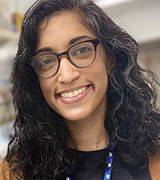
Human Diseases Section, Genetics and Biochemistry Branch, National Institute of Diabetes and Digestive and Kidney Diseases
Research: Using techniques from biochemistry, genetic screening, and neurobiology in human-induced pluripotent stem-cell-derived tissues to study how genetic and environmental factors alter fundamental cellular pathways to increase susceptibility or improve resilience to neurodegenerative diseases such as Alzheimer disease; identifying novel therapeutic or preventative mechanisms for neurodegenerative diseases.
Became Stadtman Investigator in 2020
Lauren Porter, Ph.D. (NLM)
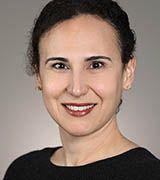
Structural Bioinformatics Group, National Library of Medicine
Research: Developing data-driven computational methods and using experimental methods to predict and characterize fold-switching proteins, many of which are associated with diseases such as cancer, autoimmune disorders, and bacterial and viral infections.
Became Stadtman Investigator in 2019
Kaitlyn Sadtler, Ph.D. (NIBIB)
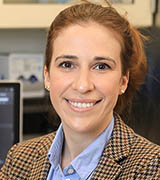
Section on Immunoengineering, National Institute of Biomedical Imaging and Biomedical Engineering
Research: Understanding how the immune system interacts with implants such as medical devices and scaffolds for tissue regeneration; combining advances in biopolymers and cellular engineering to program immune responses to allow tissue growth and integration with these materials.
Became Stadtman Investigator in 2019
Nadine L. Samara, Ph.D. (NIDCR)

Structural Biochemistry Unit, National Institute of Dental and Craniofacial Research
Research: Using protein structure, biochemistry, and microbiology to investigate the molecular mechanisms of glycosylation at the host-microbe interface; exploring the role of carbohydrates in the pathogenesis of oral and systemic diseases.
Became Stadtman Investigator in 2019
Christina I. Schroeder, Ph.D. (NCI-CCR)
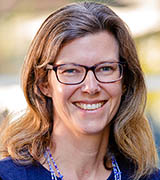
Chemical Biology Laboratory, Center for Cancer Research, National Cancer Institute
Research: Using peptide engineering of complex bioactive peptides targeting ion channels upregulated in cancer; unlocking a detailed understanding of how these bioactive peptides engage with receptors and ion channels; designing diagnostic tools that unravel the importance of ion channels in cancer.
Became Stadtman Investigator in 2020
Han-Yu Shih, Ph.D. (NEI)

Neuro-Immune Regulome Unit, National Eye Institute
Research: Using multidisciplinary genomic approaches to understand the mechanisms that precisely regulate gene expression in lymphoid cells; analyzing lymphocyte regulomes with distinct genetic background in humans and engineered mice to further our understanding of molecular mechanisms that contribute to aging and neurodegenerative diseases.
Became Stadtman Investigator in 2019
Joshua Tan, Ph.D. (NIAID)
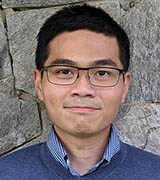
Antibody Biology Unit, National Institute of Allergy and Infectious Diseases
Research: Using cutting-edge technology to study B cells at the single-cell level and to identify and characterize human monoclonal antibodies against a range of pathogens; studying basic antibody biology; investigating the use of monoclonal antibodies for prevention of infection and as tools for vaccine design.
Became Stadtman Investigator in 2020
Eugene Valkov, D. Phil. (NCI-CCR)
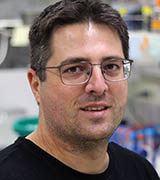
Messenger RNA Regulation and Decay Section, RNA Biology Laboratory, Center for Cancer Research, National Cancer Institute
Research: Unveiling the molecular events that determine whether messenger RNA (mRNA) is destroyed, stored in the cytoplasm, or translated into protein; using this knowledge to manipulate mRNA metabolism with precision for therapy. Combining biochemical reconstitution with biophysical investigations, structure determination, and cellular analyses to provide testable mechanism-based hypotheses.
Became Stadtman Investigator in 2019
Jason Watts, M.D., Ph.D. (NIEHS)

Transcriptional Responses in Disease Group, National Institute of Environmental Health Sciences
Research: Studying the mechanisms by which nucleic acid sequences and structures regulate RNA polymerase pausing, and how RNA polymerase pausing contributes to the control of gene expression in response to physiologic and environmental stress.
Became Stadtman Investigator in 2020
Euna Yoo, Ph.D. (NCI-CCR)
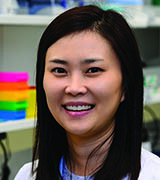
Chemical Biology Laboratory, Center for Cancer Research, National Cancer Institute
Research: Discovering novel chemical approaches and molecules that can address immunological problems in cancer therapy; using natural product screening and synthetic chemistry to develop chemical probes that detect and perturb key regulators of biochemical and signaling pathways and functional enzymes involved in immune activation and tolerance.
Became Stadtman Investigator in 2019
This page was last updated on Tuesday, May 17, 2022
